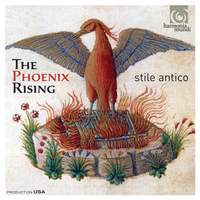Recording of the Week,
Tudor Church Music from Stile Antico
A new disc by Stile Antico is always a delight; this is a bold, relatively new vocal ensemble whose collaborative approach to music-making – eschewing a conductor, and rehearsing and performing as a collective – brings great freshness and originality to their performances of the early repertoire they specialise in. Their latest release presents just a tiny selection of the huge range of pieces restored to musical life by the Tudor Church Music project, carried out in the 1920s under the auspices of the Carnegie Trust (which celebrates its centenary this year). This initiative produced ten volumes of easy-to-use, modern editions of Tudor and Renaissance choral music, and its impact on the repertoire of church choirs in Britain would be hard to overstate – music of this period had had a very low profile before the project was undertaken, and its current popularity is in many ways due to the TCM series’s success among musicians.

Stile are known for providing a warmer, fuller choral sound than some other early music ensembles, and this disc is certainly no exception. There’s a fine line to be trodden with pieces such as Gibbons’s O clap your hands – often taken at a brisk tempo in view of its upbeat subject matter, with that first line an open invitation to a punchy, even boisterous performance. Stile’s interpretation caught me by surprise not so much for its speed, though this is indeed slower than I am used to hearing, but for its sustained legato tone. The result: a piece that can sound choppy and staccato here has an almost regal broadness to it.
As well as some time-honoured staples of the Tudor repertoire (Byrd’s Ave verum Corpus makes an appearance too, alongside his five-part Mass), there are other pieces on this album that fully justify its title – the phoenix image is a good metaphor for works such as Robert White’s Portio mea, salvaged from relative obscurity by diligent scholarship and championed by those with an eye for lost gems. Portio mea is a setting of words that don’t often appear in music, a supplicatory passage from the middle of Psalm 119 which draws from White a delightfully fluid work – the effortless, ethereal but still full sound of the Stile Antico soprano section is a joy to hear, particularly in the higher passages.
For me the still, poised opening of Tallis’s In ieiunio et fletu is one of the most haunting moments in the Tudor repertoire, and Stile Antico judge perfectly the buildup from this hushed beginning towards the more agitated expressions of grief that form the meat of the work. The original version of this piece is extremely low in pitch, with the basses sent down to bottom Ds on a regular basis, so it’s common to transpose it up in modern performance, sometimes by up to a sixth. Stile have chosen to lift the pitch by just a third, which results in quite a deep and male-dominated sound. The basses and particularly baritones lend a welcome richness to certain passages – and the effect of some of the low, tightly-spaced chords towards the end of the piece is wonderful.
Stile Antico’s choice of repertoire here is well balanced between established favourites and lesser-known “phoenix” works that are rarely if ever recorded. The performances are of the exceptionally polished standard that has earned the group such a high reputation around the world; it’s a real box of treasures!
To celebrate this new release, until mid-September we’re offering 25% off not only this disc but all Stile’s other albums as well – full details available here.
Stile Antico
Available Formats: MP3, FLAC, Hi-Res FLAC



